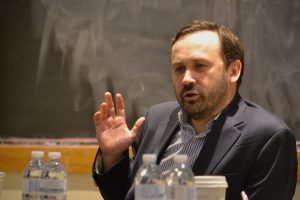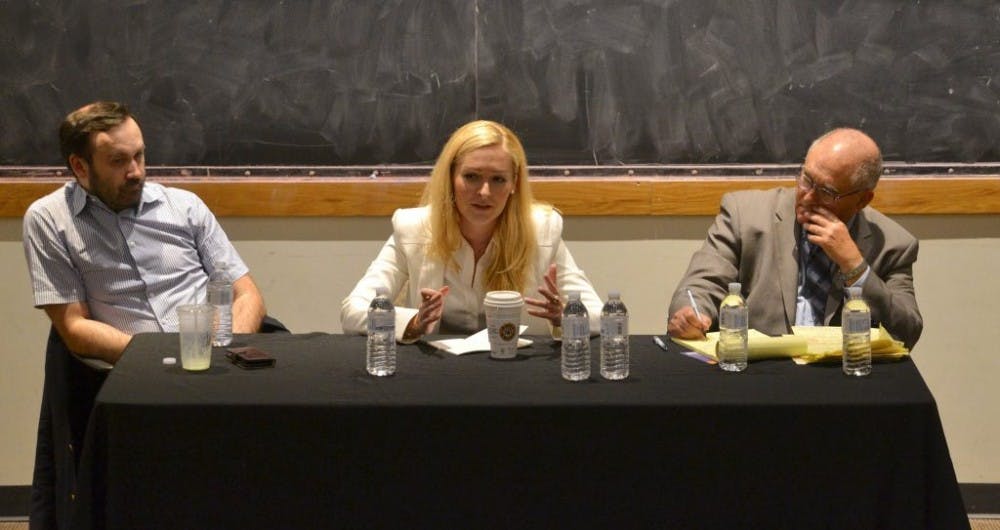Exiled Russian politician Ilya Ponomarev and his chief of staff Anastasia Popova discussed the current political climate in Russia on Thursday, April 20.
European Horizons and Hopkins Model United Nations (HopMUN) hosted the discussion, which also featured Robert Freedman, a visiting political science professor who is currently on leave from the University.
Ponomarev was the sole member of the State Duma, the Lower House of the Federal Assembly of the Russian Federation, to vote against Russia’s annexation of Crimea during the 2014 invasion of Ukraine. Several months later, while he was visiting the U.S., Ponomarev’s bank accounts were frozen and he was unable to return to Russia.
After summarizing recent developments with Russia’s international relations, with emphasis on Putin’s actions in Syria and Ukraine, Freedman asked Popova and Ponomarev about the future of Russia’s relationship with the U.S.
Ponomarev said that the U.S. tried to ‘reset’ its relationship with Russia after Obama’s 2008 election, an effort that was successful until Putin returned to power in 2012. According to Ponomarev, Putin ruined the positive measures he took in his first two terms.
“Instead of a country which is developing, working for business and part of general Western civilization, we have a country which is fighting with our closest neighbor and closest relative, Ukraine,” he said.
Expressing concern that Russia’s occupation of Crimea would hinder relations with the U.S., Freedman questioned the morality of continued business between the two countries.
He said that America had to decide whether they were comfortable accepting Russia’s aggression or whether they would resist Putin on ethical grounds. Freedman was unsure what the U.S. would do.
“Given the Russians are in Crimea, given the Russians are in Eastern Ukraine, do we just wave this away as Obama did?” Freedman asked. “Or do we say no, this is wrong?”
Popova said that while the U.S. tries to maintain the moral high ground, Putin violates ethics in his use of propaganda to corrupt the relationship between the two countries.
“The Kremlin and the White House are bargaining the best options,” she said. “I would more say that the Kremlin is [bargaining] and Washington, D.C. is still trying to apply some diplomatic ways of solving the international issues.”
Ponomarev agreed, explaining that Putin believes money is the key to success. He said that debate persists in the U.S. over whether morality is the foundation of foreign policy or whether they should focus on short-term interests.
In response to a question from Freedman on whether Putin could be trusted, Ponomarev said one could be sure of doing business with him.
“That’s what he’s asking for,” Ponomarev said. “For him, to do business is all about money. It’s not about values. It’s not about ideals. It’s not about aspiration. It’s not about people.”
He said that the questionable morality of Putin’s diplomacy indicated fundamental ethical changes in the developed world and said that these changes are clearest in the discourse surrounding ‘alternative facts.’ He blamed Putin for using propaganda to instigate this discourse.

“It was [Putin] who said that there are no such things as facts,” Ponomarev said. “It’s very frightening. We cannot tell for sure whether what we see... is true or not.”
Popova agreed, saying that Putin relied on propaganda to maintain control.
“Right now in Russia there is no independent or free media,” she said. “Everything is controlled by government channels. They give the final opinion and, for people who are not interested in analysis or finding new points of the same issue, that’s a winning strategy.”
According to Ponomarev, Putin used his propaganda machine to influence foreign elections like the current French election and the 2016 U.S. presidential election. He said that Putin’s aim was not to influence the result of the elections but to compromise the democratic process.
HopMUN Treasurer Caroline Lupetini, a sophomore who helped coordinate the panel, said it was timely, considering the ongoing political shifts in the United States and Europe.
“It’s so relevant, so timely with the election and then with Brexit and the French elections happening this weekend and the runoff in early May,” she said.
She said that they invited Ponomarev and Popova hoping that they would challenge American students’ perceptions of Russian diplomacy.
“They both provided really incredible commentary both on what domestic political life is in Russia as well as what Putin’s leadership style is and what he represents to the Russian people,” she said.
She also said that Ponomarev and Freedman provided balanced perspectives on the subject.
“Dr. Freedman has this idea as a scholar of Russian foreign policy whereas Ponomarev, he’s lived it, he’s experienced it. They gave me a lot of disruptions of my preconceived notions of what Putin wants,” she said.
Freshman David Saveliev appreciated the opportunity to gain Ponomarev’s perspective.
“It was overall a very deep and insightful look in Russian politics,” he wrote in an email to The News-Letter. “Ponomarev was quite charismatic and gave a very interesting and detailed perspective. He was very anti-Putin, but not as pro-Western as one would expect.”





